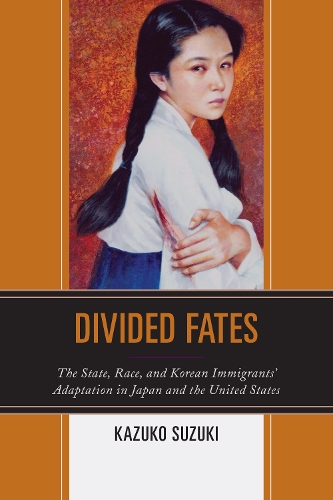
Divided Fates: The State, Race, and Korean Immigrants' Adaptation in Japan and the United States
(Hardback)
Available Formats
Publishing Details
Divided Fates: The State, Race, and Korean Immigrants' Adaptation in Japan and the United States
By (Author) Kazuko Suzuki
Bloomsbury Publishing PLC
Lexington Books
12th May 2016
United States
Classifications
Professional and Scholarly
Non Fiction
Social discrimination and social justice
Ethnic studies
305.8957052
Winner of ASA Book Award on Asia/Transnational 2017
Physical Properties
Hardback
314
Width 161mm, Height 239mm, Spine 28mm
608g
Description
This book compares the Korean diasporic groups in Japan and the United States. It highlights the contrasting adaptation of Koreans in Japan and the United States, and illuminates how the destinies of immigrants who originally belonged to the same ethnic/national collectivity diverge depending upon destinations and how they are received in a certain state and society within particular historical contexts. The author finds that the mode of incorporation (a specific combination of contextual factors), rather than ethnic culture and race, plays a decisive role in determining the fates of these Korean immigrant groups. In other words, what matters most for immigrants integration is not their particular cultural background or racial similarity to the dominant group, but the way they are received by the host state and other institutions. Thus, this book is not just about Korean immigrants; it is also about how contexts of reception including different conceptualizations of race in relation to nationhood affect the adaptation of immigrants from the same ethnic/national origin.
Reviews
Suzuki offers an interesting study of different Korean diaspora communities, the zainichi and tainichi Korean communities in Japan and the Korean community in the United States. She brings the role and importance of the state back into the discussions of race and does so through a transcultural comparison that yields fruitful results. The insights offered here are well argued and thorough and contribute to the knowledge and understanding of communities with diverse backgrounds and their struggles and successes in different host countries. * The Journal of Japanese Studies *
This is the first of its kind sociological study of Korean diasporas in Japan and the United States. Dr. Kazuko Suzuki convincingly argues that the timing and means of migration, context of reception, ideology of nationhood, and broader structural circumstances in the receiving society give rise to distinct patterns of adaptation and identity formation among immigrants of the same ethno-national origin. It is a welcome addition to scholarship on comparative race, ethnicity, and immigration. -- Min Zhou, Tan Lark Sye Chair Professor of Sociology at Nanyang Technological University and co-author of The Asian American Achievement Paradox
Amassing a mlange of quantitative and qualitative data, Kazuko Suzuki has composed a cogent analysis of ethnic Koreans in Japan and in the United States. Projecting aperfect pitch between case studies and general concepts, Divided Fates is amodel comparative study. It should command the attention of scholars in comparative race and ethnicity in particular and comparative social sciences in general. -- John Lie, University of California, Berkeley
An ambitious, expertly-crafted work that offers a rare comparative analysis of three diasporic populationsZainichi, Tainichi, and American Koreansrevealing the power of the racial state and related Japanese and US structural forces to marginalize immigrants, forces which remain woefully underappreciated by Western- and single state-centered frameworks. Divided Fates is a testament to how methodological rigor and theoretical sophistication informed by multiple sites, levels, and literatures reveals the richness of history, the global order, transnationality, and political process to explain the distinct fates of a population that otherwise shares so much: their Korean origin and ethnic identity. -- Nadia Y. Kim, Loyola Marymount University
Author Bio
Kazuko Suzuki is assistant professor of sociology at Texas A&M University.
